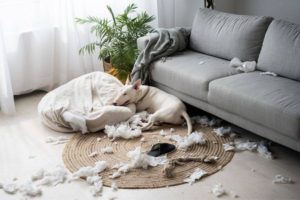Quick Navigation
- Does Airbnb Cover Accidental Damage?
- What is the Host Guarantee?
- What is the Host Liability Insurance?
- What is the Airbnb Security Deposit?
- Tips for Preventing Accidental Damage
- 1. Communicate Clearly
- 2. Set Clear Rules
- 3. Take an Inventory
- 4. Provide Protective Measures
- 5. Be Available
- 6. Label Hazardous Items
- 7. Provide Instructions for Emergency Situations
- 8. Use Smart Home Technology
- 9. Conduct Background Checks
- 10. Set Realistic Expectations
- 11. Inspect the Property
- 12. Use a Security Deposit
- FAQs
- Conclusion
As the popularity of Airbnb rises, so does the concern about potential damage to rental properties.
Most guests act respectfully and care for the property, but accidents can happen. As a host, you should understand the Host Guarantee to protect your investment and ensure a smooth guest experience.

Below, I’ll cover everything you need about Airbnb accidental damage, so let’s dive right in.
Does Airbnb Cover Accidental Damage?
Airbnb covers accidental damage through the Host Guarantee program.
The program protects up to $3,000,000 for eligible damages caused by guests during their stay, such as accidental damage to furniture or fixtures.
However, the Host Guarantee program has certain exclusions and limitations.
Therefore, it’s always best to review the policy details and consult with Airbnb directly if you have any questions or concerns.
I also suggest purchasing additional insurance coverage for protection beyond the Host Guarantee program.
What is the Host Guarantee?
The Host Guarantee is a program offered by Airbnb that protects eligible damages up to $3,000,000 caused by guests during their stay.
The program is designed to provide hosts with peace of mind and encourage guests to be responsible and respectful during their stay.
The Host Guarantee covers a wide range of damages.
Those damages include accidental damage to furniture or fixtures, damage caused by a guest’s pets, and damage from theft or vandalism.
However, note that the Host Guarantee has certain exclusions and limitations.
Those exclusions and limitations include damages caused by normal wear and tear or intentional damage by a guest.
If a host needs to file a claim with the Host Guarantee program, they must provide documentation of the damage.
Therefore, you must have photos or receipts of the damage and work with Airbnb to resolve the issue.
Hosts and guests should communicate openly and honestly about issues or concerns during the stay.
Communication can prevent and address any potential damages.
What is the Host Liability Insurance?
Host Liability Insurance is a specific insurance policy. It’s designed for people who use their homes or other properties for short-term rental through platforms like Airbnb.
The policy covers the host against liability claims for property damage or bodily injury that may occur during a guest’s stay.
Airbnb offers Host Protection Insurance to all hosts who list their properties on the platform. This insurance policy covers up to $1 million in liability claims arising from a guest’s stay.
The policy covers many potential liability scenarios, including property damage, bodily injury, and defamation claims.
However, this insurance doesn’t cover all types of damages or losses. For example, it may not cover intentional acts of the guest, damage to personal property, or lost income due to cancellations.
Things that the Host Guarantee Covers:
- Damage to the host’s property caused by guests, such as broken furniture or appliances.
- Damage to common areas of the building or community caused by guests, such as hallways or elevators.
- Damage caused by guests’ pets, if the host has a pet-friendly listing.
- Vandalism by guests, such as graffiti or intentional destruction of property.
- Theft of the host’s personal property by guests.
Things that the Host Guarantee Doesn’t Cover:
- Damage caused by the host’s actions or negligence, such as failing to maintain the property or leaving valuables in plain sight.
- Damage caused by natural disasters or weather events, such as floods or earthquakes.
- Intentional damage or theft by the host or a third party.
- Bodily injury or harm to guests or their personal property (this is typically covered by Airbnb’s Host Protection Insurance).
- Lost income due to cancellations or other factors (the Host Guarantee doesn’t cover this).
What is the Airbnb Security Deposit?

You can ensure the safety of your property by placing a security deposit. The Airbnb security deposit is a sum of money you, as the host, may require from a guest.
This deposit will cover any damages or losses during the guest’s stay.
When a guest books a listing, the host can require a security deposit of up to $5,000. If the host chooses to require a security deposit, the guest will be notified at the time of booking.
Then, the amount will be added to the total cost of the reservation.
If the host determines there has been damage to their property during the guest’s stay, they may file a claim with Airbnb.
However, the host must file the claim within 14 days of the guest’s departure. The security deposit will then be used to cover the cost of the damages up to the deposit amount.
If the cost of the damages exceeds the security deposit amount, the host may file a claim with Airbnb’s Host Guarantee program. Or they can pursue other legal action to recover the costs.
It’s important to note that not all Airbnb hosts require a security deposit. Also, guests should always review the listing details and house rules carefully to understand the terms of their stay.
Lastly, hosts must comply with Airbnb’s policies regarding security deposits.
Those policies include providing evidence of damages and communicating with guests promptly and nicely.
Tips for Preventing Accidental Damage
The Airbnb accidental damage policy provides a safety net for hosts, but it’s always best to prevent damage from happening in the first place.
Here’s a list of helpful tips to minimize the risk of accidental damage:
1. Communicate Clearly
Before the guest arrives, provide clear instructions on how to use any equipment or appliances in the house. This can include guidelines on using the stove, oven, washing machine, and other appliances.
2. Set Clear Rules
Ensure you have clear and easily accessible house rules. These rules can include rules on smoking, pets, and any other specific instructions.
3. Take an Inventory
Before the guest arrives, inventory all items in the house and document their condition. This can help you keep track of any damage that occurs during the guest’s stay.
4. Provide Protective Measures
Protective measures like coasters, placemats, and furniture covers can help minimize the risk of accidental damage. So, consider adding these details for extra safety.
5. Be Available
Remain available to the guest during their stay, so they can ask questions or report any problems as soon as possible.
6. Label Hazardous Items
Label hazardous items or areas in the house, such as sharp knives or a swimming pool, to ensure guests know the risks.
7. Provide Instructions for Emergency Situations
Provide clear instructions for handling emergencies, such as power outages or fires.
8. Use Smart Home Technology
Consider using smart home technology, such as smart locks, cameras, and sensors. These smart devices can help you monitor the property and prevent potential damages.
9. Conduct Background Checks
Consider conducting background checks on guests before accepting their reservations. That way, you can ensure they have a good track record of being responsible and respectful during their stays.
10. Set Realistic Expectations
Be upfront with guests about the condition of the property and any limitations. For instance, mention if the property isn’t suitable for small children or has off-limits areas.
11. Inspect the Property
After the guest leaves, inspect the property for damages. Also, document any damages with photos or videos.

12. Use a Security Deposit
If you’re concerned about potential damages, require a security deposit from guests. Also, communicate the terms and conditions of the deposit.
FAQs
What Happens if You Accidentally Damage an Airbnb?
If you accidentally damage an Airbnb property during your stay, it’s important to notify the host and report the damage immediately.
The host will assess the damage and may file a claim with Airbnb’s Host Guarantee program. This program protects eligible damages up to $3,000,000.
The host may also request reimbursement for damages exceeding the coverage limit. Or damages that aren’t covered by the Host Guarantee program.
If you’re concerned about accidentally damaging a property, it’s always best to take preventive measures to minimize the risk of damage.
This includes following the house rules and instructions for using equipment or appliances. It also includes being mindful of hazards and reporting accidents or incidents to the host as soon as possible.
Being responsible and respectful during your stay can help ensure a positive experience for yourself and the host.
Who is Responsible for Damages at an Airbnb?
Determining responsibility for damages at an Airbnb depends on the circumstances. Generally, the guest who causes the damages is responsible for paying for them.
However, if the damage is caused by something outside the guest’s control, the host may fall responsible for covering the costs.
For instance, the guest won’t be responsible for a leaky roof or faulty plumbing.
If a host believes that a guest has caused damage to their property, they should immediately communicate with the guest.
That way, they can report the damages on time and discuss potential solutions.
The host may also file a claim with Airbnb’s Host Guarantee program, which protects eligible damages up to $3,000,000.
Both hosts and guests must take preventive measures to minimize the risk of damage during a stay.
Conclusion
Being proactive and prepared can minimize the risk of accidental damage to your Airbnb property and protect your investment.
Remember to communicate clearly with your guests about the rules and expectations for the rental. Also, provide clear instructions for using any equipment or appliances.
Lastly, consider investing in additional insurance coverage for added protection.
Following these guidelines and staying informed about the accidental damage policy can give you peace of mind as a host. And you can ensure a positive experience for your guests.






